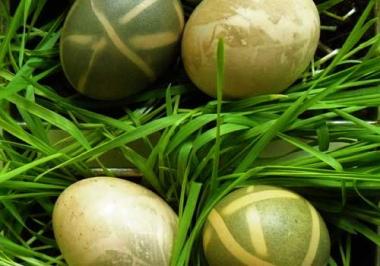"There are few pleasures that beat sitting in your veg patch in May with people you love, your just-cut asparagus cooking on a camping stove and almost ready to eat with a little butter, salt, pepper and Parmesan. Pour a glass of something dry made from grapes or apples and you'll be enjoying the best that the good life has to offer."—Mark Diacono
This is from Veg Patch, one in a series of Bloomsbury (U.K.) books published by the people over at River Cottage in East Devon, England. River Cottage is a consortium of scoundrels and wastrels who cavort on a farm/estate where workshops are held. Dressing game, extreme fishing and cooking from scratch are the order of the day. If flying to East Devon isn't part of your austerity budget, River Cottage Handbooks (www.rivercottage.net) are a good substitute.
In 254 pages of photos and instructions, author Mark Diacono outlines "how to grow," "how to harvest," "problems and pests" and "how to eat." Green oak leaf is praised because it can be "plucked perfect cut-and-come-again right through winter." Winter greens are a luxury enjoyed by few, but they can be enjoyed in these parts.
This month, several farms in the Valley have a jump on the season, offering winter and spring greens. "Wintered over" plants spend the dark months in the earth underground or in minimally heated hoop houses. Spinach, red curly lettuce, arugula ("rocket" in the language of the River Cottage gang) and bok choy are hearty and very sweet, unlike their warmer-weather mates. Farms such as Seeds of Solidarity in Orange, Red Fire Farms in Granby and Simple Gifts in Amherst are growing these crops early in the season and selling them to restaurants and stores.
Early in March, Hope and Olive, a restaurant in Greenfield, was offering a goat cheese salad with greens from Seeds of Solidarity. Tabella Restaurant in Amherst has been serving greens all winter. "We were getting our greens from Red Fire and then in early March from Simple Gifts Farm as well," says Adrian Derrico, owner of Tabella, which had organic spinach, mesclun greens, baby bok choy and cilantro-based dishes on the menu. "Both of these farms really knocked our socks off with great quality and flavor."
Bok choy produces sweet little yellow flowers that appear when it "bolts," as they say in both the U.K. and the U.S. (That's similar to the "bolting" process of basil, which refers to a late growth stage.) "The bok choy florets are so yummy and beautiful," says Derrico. Most of the dishes—small plates, as they are called—feature food from area farms. "I would offer a Red Fire Farm organic bok choy florets salad with Round Hill Apiaries honey-glazed Sunset Farm chestnuts, Goat Rising chevre and West County cider vinaigrette. Cheers!" he adds.
Grow Your Own: Workshop
Where to start? At Laughing Dog Farm in Gill, the basics on seeds, seed saving, seed storage, testing and viability will be covered in this workshop aimed at the beginner-level backyard grower who is actively imagining, starting and perhaps expanding into small-plot, "bio-intensive" crop production. The importance of heirlooms will be covered as well as other topics. Daniel Botkin, owner of Laughing Dog, will demonstrate several low-tech, spring germination and "seedling-grow" options using minimum space/heat with the help of the unheated high tunnel (hoophouse) for early propagation. He will also demonstrate basic techniques for compost making, soil mixing (for seeding and transplanting) and "damping off" prevention. The workshop takes place at Laughing Dog Farm in Gill from 10 a.m. to 1 p.m. on Saturday, April 11. Suggested donation is $15 to $45 per class. RSVP requested. Contact dbotkin@valinet.com.
Locavore Tip: Tie-Dyed Farm Eggs
A dozen farm eggs from a neighbor's hens and some frozen blueberries are a winning Easter egg combo. Neighbor eggs are more prevalent than you would think. Cheaper than the organic kind encased in plastic, farm eggs not only have a lovely orange yoke and an eggier flavor; their irregular shapes and brown freckles make for a really beautiful Easter egg. The palate is muted and the porous shell can take color better than factory-farmed eggs. And what better way to put frozen blueberries to use?
To begin the process, cook down several cups of frozen blueberries and drain them. You will be left with about a cup of blueberry juice. Let it sit. Hard-boil a dozen eggs and, when cooked, wrap each with rubber bands, two to three apiece.
Submerge the bound and gagged eggs into the blueberry juice and let sit for a half an hour or so, depending on how inky blue you want the eggs to be. Remove with a slotted spoon, take off the rubber bands slowly, and voila! eggs that are all about spring, a time for the rebirth of life and blueberries.



